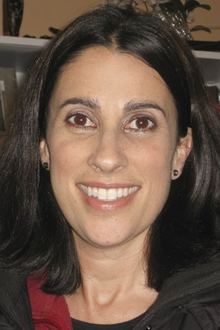Film examines notion of 'happily ever after'
Hadassah-Brandeis Institute editor Michelle Cove's documentary looks at why modern women remain single later

Michelle Cove
The film is a result of two years of interviews with hundreds of 30-something women who candidly share their feelings about dating, love and marriage. With the number of single women in the U.S. at a record high, the documentary delves into questions such as: Are women choosing careers over marriage? Has financial independence changed singlehood? Can women live a happy and fulfilled life without a partner? Are childhood fairytales creating unhealthy goals for girls?
"The purpose of this film," says Cove, "is to challenge women to stop thinking about happily ever after in terms of princes and picket fences, and get them to start thinking about what happiness looks like for them now as adult individuals."
Cove is the editor of "614: the HBI eZine" an online magazine from the Hadassah-Brandeis Institute that aims to spark conversation about hot topics among young Jewish women. She is also the author of the national bestseller "I'm Not Mad, I Just Hate You: A new understanding of mother-daughter conflict" (Viking 1999) and "Seeking Happily Ever After: Navigating the ups and downs of being single without loosing your mind - and finding lasting love along the way" (Tarcher/Penquin 2010), a result of the research culled from the documentary.
 |
| Want to see ‘Seeking Happily Ever After’? 'Seeking Happily Ever After' won the 2010 New York United Film Festival Audience Award for best documentary has been chosen as part of Women Take the Reel, a film festival celebrating Women's History month at Massachusetts Institute of Technology. For local screenings, to watch On Demand, or to download the documentary, visit Cove's website. |
 |
Seeking Happily Ever After Trailer from Michelle Cove on Vimeo.
The idea to undertake the film came in 2007 when Cove kept seeing news headlines reporting the all-time high of single women in their 30s. Cove says that she wanted to find out why. The fact that she was single herself until her mid-30s gave her a particular passion for the subject.
With no film experience behind her, she bought a $200 camera and went around Boston approaching women who weren't wearing wedding bands and appeared to be in the target age group. Cove explained what she was doing and asked if she could interview them. What was startling, she says, is that they all replied yes.
"One of the biggest questions for me was whether or not the women were going to be honest or if they were going to say things like ‘I'm so independent,' or ‘Look at me, I'm a modern woman,'" says Cove. "What I was delighted to find out was that they dropped their guard and left it on the floor. Nobody had ever asked them these questions and they wanted to talk about it."
Because the story is nuanced, Cove says, she felt film was the medium of choice, as she wanted to be able to show women grappling with their answers.
She partnered with Kerry David, a Los Angeles producer who mentored Cove throughout the process.
In addition to the women who are interviewed, Cove includes more than 15 experts such as media professionals, authors, psychologists and business and economics professors.
"From the moment a girl is born, at least in our American Culture, she is taught to want that dream of riding off into the sunset with prince charming," Garland Waller, a professor of television at Boston University, says in the film. "And that's sort of a crime, because I don't think that we're helping our young women find the center that will make them strong and happy forever."
Cove also touches on the male perspective.
"A lot of people assume that men in their 30s have it easy -- that they're swinging bachelors and that there's no stigma or pressure," says Cove. "Talking to them, it became clear that they in fact face quite a bit of pressure."
Many men say that they don't want to be a first-time dad in their 50s or 60s and that their parents want grandchildren. The big difference, says Cove, is that they don't have a biological clock ticking.
"It's not as if the women who aren't married are wallflowers or neurotic or incompetent," Shula Reinharz, director of Women's Studies Research Center at Brandeis, says in the film. "It could be the other way around -- that they are so accomplished and attractive that they have high standards."
The documentary features Jacquie, a 33-year-old single Boston native who takes the audience into her home and life as the camera follows her on a night of Speed Dating, to a group singles gourmet dinner, a day of community service for singles, and to a private dating service.
Jacquie also shares the impact of her parents' divorce, an issue that she has been struggling with since she was a teen.
"Because of how my parents' marriage ended, which was a result of infidelity, I always thought that you could get married and be happy -- but you have to know that it may not last forever," Jacquie says in the film.
Cove says once she started asking people what could happily ever after look like, she began to get great answers like "paying back law school loans," and "I think that I want to adopt," and "I want to live with someone but I don't know if I want to get married," and "I still want to get married but I don't want to settle like my mom did."
Cove says she wants people to take away from the documentary that there is no one answer to what happily ever after looks like. That, she says, "is for each of us to sit down and decide with intention for ourselves."
Categories: Arts, Humanities and Social Sciences






